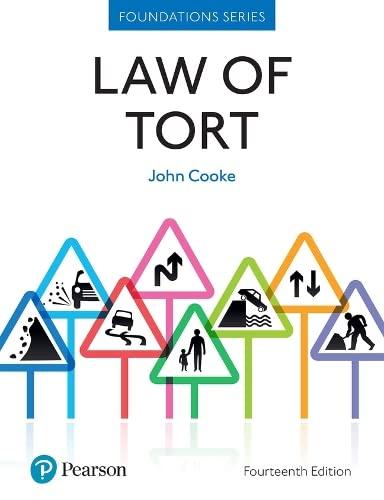Question
Each member of a certain organization agrees to give other members the most favorable treatment with regard to imports or exports. This organization is a.the
Each member of a certain organization agrees to give other members the most favorable treatment with regard to imports or exports. This organization is
a.the Convention on Contracts for the International Sale of Goods.
b.the International Export-Import Bank.
c.the United Nations.
d.the World Trade Organization.
3.Flo is a U.S. citizen working in Germany for Holiday Tours, Inc., a U.S. firm. Irma is a German citizen also working for Holiday in Germany. Holiday discharges both Flo and Irma, for reasons that they believe violate U.S. discrimination laws. Those laws protect
a.Flo and Irma.
b.Flo only.
c.Irma only.
d.neither Flo nor Irma.
5.Digital, Inc. sells equipment to link businesses via the Internet.Digital will be considered to have monopoly power if its share of the relevant market is equal to or exceeds (but not less than)
a.50 percent.
b.60 percent.
c.70 percent.
d.80 percent.
6.Congress enacted a law to help prosecute violators ofrestraints on trade and monopolies by establishing theFTC. The FTC enforces:
a.the Clayton Act.
b.the Federal Transportation Commission Act.
c.the Interstate Commerce Act.
d.the Sherman Act.
14.Able, Inc., and Baker Corporation are the only suppliers in their market. They agree to coordinate their production so as to limit output and charge a higher price. This is
a.a restraint of trade and reasonable.
b.a restraint of trade and unreasonable.
c.not a restraint of trade and reasonable.
d.not a restraint of trade and unreasonable.
16.Beta Corporation conditions future shipments of its products to retailer Gamma
Stores, Inc., on Gamma's agreement not to buy products from Kappa Company,
Beta's competitor. This is
a.predatory pricing
b.exclusive dealing.
c.price discrimination.
d.price fixing.
18.Operating Systems Corporation (OSC), a software maker, is charged with violations of
the Sherman Act. Remedies under this act could include making OSC
a.dissolve itself and end its operating functions only.
b.divest itself of one or more of its operating divisions only.
c.dissolve itself and end its operating functions, or divest itself of one or more
of its operating divisions.
d.none of the above.
19.Antitrust laws donotapply to
a.labor unions only.
b.professional baseball only.
c.the insurance industry only.
d.labor unions, professional baseball, and the insurance industry.
20.Fine Products, Inc., has exclusive control over the
market for its product. Fine's market power is subject
to evaluation under
a.the Clayton Act, Section 10.
b.the Federal Trade Commission Act, Section 3.
c.the Interstate Commerce Act, Section 2.
d.the Sherman Act, Section 2.
22.Omar opens a business and makes a good product and has good relationships with
his customers and vendors because of his ethical principles. Juan has a similar
business but can't compete with Omar and closes his business and so do two other
businesses in the area leaving Omar with 80% of the relevant market. Omar has
a.violated the Sherman Act, section 2under monopolies.
b.violated the Sherman Act, section 1 monopolies
c.not violated any Antitrust law.
d.violated the Clayton Act under price fixing.
23.Jane, a tenant, has a dog that is always snapping and growling at people. The
landlord allows pets in the building. Another tenant, Carol, is bitten by Jane's dog.
a.Carol cannot sue the landlord unless she is also a tenant in the
building.
b.Jane cannot be sued because pets are permitted and the landlord
is responsible for the actions or her tenants and their pets.
c.Jane may be liable if she knew that the dog was vicious and did not
warn other tenants.
d.Carol assumes the risk of being in an apartment where pets are
allowed.
24.A Ross Store customer sues for false imprisonment because she was detained for
shoplifting and was escorted to the employees' lunch room to wait for the police.
Which is a true statement:
a.Ross Stores is strictly liable for all its actions against customers..
b.Ross Stores will not be sued because under the Shopkeeper's rule store
employees can detain anyone for any amount of time to protect against
losing money.
c.The customer will win a lawsuit under negligence per se as store
employees cannot detain anyone.
d.The customer may win her lawsuit even if she did shoplift if she was detained unreasonably andfor an unreasonable amount of time
Step by Step Solution
There are 3 Steps involved in it
Step: 1

Get Instant Access to Expert-Tailored Solutions
See step-by-step solutions with expert insights and AI powered tools for academic success
Step: 2

Step: 3

Ace Your Homework with AI
Get the answers you need in no time with our AI-driven, step-by-step assistance
Get Started


